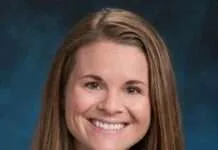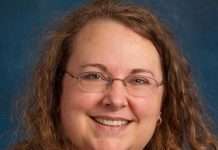Headlines
Hall Center for the Humanities announces speaker series for 2021-2022
LAWRENCE — The Hall Center for the Humanities’ speaker series for 2021-22 will focus on questions of environmental sustainability in an era of climate change. Speakers will include Amitav Ghosh, Bathsheba Demuth, Robin Wall Kimmerer, Alexis Pauline Gumbs and Terry Tempest Williams. Programs are planned to take place in-person but subject to change due to the pandemic, and all events will be livestreamed.
KU researcher to test community-based method to help adolescents with autism take lead in education, careers
LAWRENCE — A University of Kansas education researcher has earned a grant to test an intervention designed to enhance self-determination for adolescents with autism to improve education, community participation, and physical and mental health outcomes. The work, to be conducted with adolescents near KU’s Lawrence and Edwards campuses, is unique in part because it will include collaboration with students outside of a school setting.
Full stories below.
————————————————————————
Contact: Eliott Reeder, Hall Center for the Humanities, 785-864-4798, [email protected], @KUHallCenter
Hall Center for the Humanities announces speaker series for 2021-2022
LAWRENCE — The Hall Center for the Humanities’ speaker series for 2021-22 will focus on the theme In Search of Harmony: The Humanities and Our Natural World. The evolving relationship with the natural world we inhabit and questions of environmental sustainability in an era of climate change figure among the most pressing issues that we face today.
Debates relating to the environment and questions of sustainability often center on work by scientists, yet humanities scholars and creative writers have much to contribute to these conversations. The rapidly growing field of environmental humanities incorporates a range of disciplinary approaches, including but not limited to history, literary studies, philosophy and religious studies. The Hall Center series features a range of humanities scholars and creative writers whose exciting, thought-provoking work explores the complicated relationships between humans and the living world that surrounds us, including Amitav Ghosh, Bathsheba Demuth, Robin Wall Kimmerer, Alexis Pauline Gumbs and Terry Tempest Williams.
In addition, Clint Smith will visit to speak about his new book, “How the Word is Passed: A Reckoning with the History of Slavery Across America.” Andrew Denning, associate professor of history, will give a Meet KU’s Authors talk about video gaming at the public library. Irin Carmon, co-author of “Notorious RBG,” will speak about late Justice Ruth Bader Ginsburg’s inspiring life and career. Renowned pianist and composer Emilio Solla will visit campus for two performances and a talk about the history of tango music. And the 700th anniversary of Dante Alighieri’s death will be marked by Simone Marchesi speaking about a new digital project that reconstructs the ways in which Dante’s early readers would have visualized the world he evoked in his famous narrative poem, “The Divine Comedy.”
Additional events for spring 2022 will be announced at a later time.
The Hall Center intends to host events in person this fall, yet the situation due to COVID-19 remains volatile, and plans may change based on the concerns of speakers and audience members as well as in response to mandated restrictions. Regardless of the format used for each event in this speaker series — whether in-person, hybrid or entirely virtual — all events will be livestreamed via the Hall Center’s Crowdcast channel. Venue details, registration and ticketing for live events will be announced two weeks prior to each event. Please follow the Hall Center on social media (Facebook, Twitter, Instagram), or check the Hall Center’s website for further details as the semester progresses.
Humanities Speaker Series
6:30 p.m. Sept. 14
Meet KU’s Authors
Andrew Denning, “Deep Play? Video Games and the Historical Imagination”
7:30 p.m. Sept. 21
Amitav Ghosh, “The Nutmeg’s Curse: Parables for a Planet in Crisis”
Postponed; new date TBA
Clint Smith, “How the Word is Passed: A Reckoning with the History of Slavery Across America”
7:30 p.m. Sept. 30
The Emily Taylor and Marilyn Stokstad Women’s Leadership Lecture
Irin Carmon, “Ruth Bader Ginsburg and Women’s Leadership in Modern America”
7:30 p.m. Oct. 27
Bathsheba Demuth, “Floating Coast: An Environmental History of the Bering Strait”
7:30 p.m. Oct. 28
Emilio Solla, “The History of Tango Music”
7:30 p.m. Nov. 10
KU Common Book
Robin Wall Kimmerer, Braiding Sweetgrass: Indigenous Wisdom, Scientific Knowledge and the Teachings of Plants
7:30 p.m. Dec. 7
Simone Marchesi, “Imagining Dante’s Comedy Today: Using Art and Digital Technology to Re-envisage a Literary Masterpiece”
7:30 p.m. March 22
Alexis Pauline Gumbs, “Dub: Finding Ceremony”
7:30 p.m. April 13
Terry Tempest Williams, “The Hour of Land: A Personal Topography of America’s National Parks.”
-30-
————————————————————————
The official university Twitter account has changed to @UnivOfKansas.
Refollow @KUNews for KU News Service stories, discoveries and experts.
Tweets by KUnews
————————————————————————
Contact: Mike Krings, KU News Service, 785-864-8860, [email protected], @MikeKrings
KU researcher to test community-based method to help adolescents with autism take lead in education, careers
LAWRENCE — Research has shown that when students with disabilities shape their own learning, career and life goals, they attain higher levels of achievement than when following routine curriculum and plans. A University of Kansas researcher has earned a grant to test an evidenced-based intervention designed to enhance self-determination in community-based settings for adolescents with autism to improve education, community participation, and physical and mental health outcomes.
Sheida Raley, assistant professor of special education and assistant research professor at KU’s Center on Developmental Disabilities, has earned an early career research award to conduct a pilot test of the Self-Determined Learning Model of Instruction-Autism. The SDLMI has shown great success in supporting young people with disabilities to set goals and problem-solve as they work toward their goals. However, the majority of work has been performed in schools and not necessarily specifically in partnership with adolescent with autism.
“We only have so much time during the school day, so we need to find a way to deliver these supports and interventions in settings outside of school,” Raley said. “It’s an opportune time to think about how we can use the SDLMI in a community setting to complement what is happening in schools to prepare students for the transition to adulthood, using a participatory research approach in partnership with autistic self-advocates.”
The Autism Intervention Research on Physical Health, or AIR-P network, provided the $40,000 award to the KUCDD, a collaborating research entity. Raley will partner with Ben Edwards, a research aide at KUCDD and co-researcher on the project, in piloting and testing the SDLMI-Autism intervention in community-based settings with 20 adolescents ages 16-21. Trained facilitators of SDLMI will work with youths near the Lawrence and Edwards campuses to set goals for their postsecondary education, careers, community participation, and physical and mental health, then support them in working toward those goals. The project is unique in that it will be guided by community partners with lived experience, be conducted outside of school settings and also measure physical and mental health outcomes.
Participants will take part in pre-testing, then engage in 90-minute sessions for 13 weeks. At the conclusion, the students will evaluate their knowledge and achievement again as a result of the SDLMI-Autism intervention. Participants will receive opportunities and supports to build self-determination and executive processes as well as enhance their physical and mental health. Program staff will work with adolescents, who will share their goals and plans with families, and all project activities will be guided by an Autistic Advisory Board. Among the goals is to gather feedback from participants and the board on the feasibility and usability of the SDLMI-Autism intervention, specifically for adolescents with autism, and to document what improvements should be made to enable future scaling up. Researchers will also develop a SDLMI-Autism Facilitator’s Guide for community partners who could use the intervention after the pilot project.
Data gathered on self-determination, executive abilities, and physical and mental health from autistic adolescents and their families and recommendations on improvements from the board will also support application for funding for a larger study of the SDLMI-Autism, all aligned with the goal of making it widely available.
The COVID-19 pandemic, which kept untold numbers of young people from taking part in a traditional school day or in the community, made timing of the SDLMI-Autism even more pressing. Students with autism saw challenges of transitioning from secondary education and in living healthy lives, such as maintaining physical activity and social opportunities.
“We see disparities in the autistic community as a result of a lack of supports and services. Students aren’t graduating and joining integrated, competitive employment or joining their communities at the same rates as their peers,” Raley said. “It’s not because they’re not capable. It’s because they haven’t been getting the supports they need, and we need to find ways to provide these supports in innovative ways that complement what they are provided in school.”
In addition to the board members and Edwards, who has experience in community-based autism research, Raley will work with project mentor Karrie Shogren, professor of special education and director of KUCDD, as project adviser. Shogren has led numerous projects examining the use of the SDLMI in school and community contexts, and she has published extensive research on the benefits of promoting self-determination and inclusive education.
“It’s all about working toward the overall goal of providing supports for autistic adolescents as they transition to adulthood based on what they want, and enabling community partners and schools to use a cohesive approach to promote self-determination and supporting students in chasing and achieving their education, health and life goals,” Raley said.
-30-
————————————————————————
KU News Service
1450 Jayhawk Blvd.
Lawrence KS 66045
Phone: 785-864-3256
Fax: 785-864-3339
[email protected]
http://www.news.ku.edu
Erinn Barcomb-Peterson, director of news and media relations, [email protected]
Today’s News is a free service from the Office of Public Affairs




